|
|
|
Sort Order |
|
|
|
Items / Page
|
|
|
|
|
|
|
| Srl | Item |
| 1 |
ID:
113252
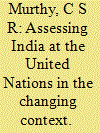

|
|
|
|
|
| Publication |
2010.
|
| Summary/Abstract |
The United Nations (UN) has been a useful instrument for India not only in pursuing its foreign policy goals effectively, but also for the progressive and peaceful transformation of the global political system. The changing priorities of the country's political leadership, the challenge of reconciling subjective interests with objective principles, the nuanced pursuit of non-alignment and sensitivity to the existing international system have historically worked as factors to create a mix of effects in India's performance in the world body. In the intricate agenda of the new century, India's participation highlights concerns on reinforcing the core strengths of the UN in managing non-traditional security threats, including transnational terrorism, mobilizing collective action in the era of globalization for minimizing the economic inequities, both within and between countries, and lastly revitalization of the UN structures including, in particular, the Security Council's composition through comprehensive reforms by common agreement. As for future strategy, the hope of replaying its past leadership role may be a less appropriate and acceptable option than building pragmatic and issue-based partnerships with all relevant countries in multilateral negotiation settings.
|
|
|
|
|
|
|
|
|
|
|
|
|
|
|
|
| 2 |
ID:
113249
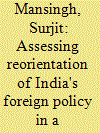

|
|
|
|
|
| Publication |
2010.
|
| Summary/Abstract |
The accelerated pace of globalization in its many facets has benefited some and disadvantaged others. India's foreign policy adjusted well to changes in the external environment by establishing cordial and increasingly substantive relations with the economic dynamos of East Asia, including China, as well as the wealthy countries of the West, especially the United States. Full realization of national objectives is impeded, however, by serious socio-economic problems at home, inadequate staffing or coordination of national security institutions, and the continuing burden of Pakistan's enmity. India's contributions to global management in the years ahead are expected to rise with its capabilities and be welcomed by most other countries as well.
|
|
|
|
|
|
|
|
|
|
|
|
|
|
|
|
| 3 |
ID:
113253


|
|
|
|
|
| Publication |
2010.
|
| Summary/Abstract |
As one of the traditional peacekeepers with vast field experiences, India should rise to new levels of peacekeeping-not just participating by way of deploying Indian troops as part of a UN force to keep peace in various parts of the world, but also by strategically utilizing its field experiences to shape new thinking about peacekeeping. Is there a case for India to take on such a role? What explains India's proactive commitment to UN peacekeeping? What is India's reputation in UN peacekeeping? Are there challenges to the leadership potential of India in UN peacekeeping? This article aims to answer some of these questions. To this end, it is argued that although India, based on its peacekeeping strengths, experiences and reputation, has more than a credible case to 'lead' new thinking about peacekeeping, complex challenges may make it difficult for India to be recognized to take such a lead.
|
|
|
|
|
|
|
|
|
|
|
|
|
|
|
|
| 4 |
ID:
113255


|
|
|
|
|
| Publication |
2010.
|
| Summary/Abstract |
The end of the Cold War coincided with a significant change in India's relationship with the rest of the world. The somnolent elephant awoke to energize itself by liberalizing its economy and quickly emerged as a potential major power in global politics. From the standpoint of its neighbours in South Asia, there might well be cause for anxiety. India has long been viewed as a hegemonic power in the region. Do the strengthening sinews of the regional 'hegemon' bode ill for them? The article argues that India was a limited hegemon in the past, but that, in the contemporary era, while its economic and military power are growing significantly, it is actually becoming less hegemonic in its orientation towards its neighbours. In contrast with its strategic behaviour in the 1980s, it has now adopted a less interventionist relationship with its neighbours and its strategic gaze is focused beyond South Asia to the global setting as it pursues the status of a world power.
|
|
|
|
|
|
|
|
|
|
|
|
|
|
|
|
| 5 |
ID:
113260
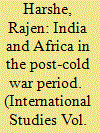

|
|
|
|
|
| Publication |
2010.
|
| Summary/Abstract |
This article presents an overview of Indo-African ties in the post-Cold War period in the context of the accelerated pace of globalization and economic reforms. It begins by taking cognizance of a few significant social realities in Africa such as the advent of democratic regimes in different African countries, the burgeoning of regional organizations as also the emergence of the African Union, the growing presence of India and China in Africa, etc. Subsequently, it analyzes the complexities of Indo-African ties in the realm of security, trade, business, investment and overall development cooperation and suggests the pathways that could refashion such ties under globalization.
|
|
|
|
|
|
|
|
|
|
|
|
|
|
|
|
| 6 |
ID:
113258
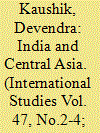

|
|
|
|
|
| Publication |
2010.
|
| Summary/Abstract |
While paying tribute to the role Rajan played in imparting a new Russian/Eurasian perspective to Central Asian studies in India, which was earlier largely Himalayancentric, the article highlights the uninterrupted character of Indo-Central Asian relationship extending over four millennia. The economic relations between the two regions of the world, however, have remained at a low level, far below their actual potential. The importance of relations with Central Asia has greatly increased due to India's growing energy demand. India may cooperate with China for reopening the Chang-Chenmo overland route along with the Kunming route connecting the Bay of Bengal with the Pacific to dissuade Beijing from developing Gwadar as a military base. Based on the richness of the historical ties successfully maintained between India and Central Asia, there can be no doubt about the strength of the motivation provided by the interconnection between geo-culture, geo-economics and geopolitics.
|
|
|
|
|
|
|
|
|
|
|
|
|
|
|
|
| 7 |
ID:
113264
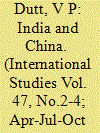

|
|
|
|
|
| Publication |
2010.
|
| Summary/Abstract |
The national movements of China and India took divergent paths and the chasm grew wider over the years. After a brief spell of bonhomie in the beginning, the relations between the two countries have been bedevilled for long by three factors, viz. the relentless suppression of the Tibetan autonomy by the Chinese, its obdurate claims on the border issue and its deliberate policy of encouraging Pakistan to undercut India's stature in regional and world politics. As for the future, it may be fair to say that the two Asian powerhouses cannot be friends, nor need they be enemies. There would be areas of engagement in the new sense of the term and areas of discord. Harmonizing Indian nationalism and Chinese nationalism would be the test of statesmanship in both countries. As there is no immediate challenge from China, India would be well advised to continue engaging China with a measure of caution and vigil.
|
|
|
|
|
|
|
|
|
|
|
|
|
|
|
|
| 8 |
ID:
113266


|
|
|
|
|
| Publication |
2010.
|
| Summary/Abstract |
In the first decade of the post-Cold War era, relations between India and Russia have suffered because of mutual neglect and clear attempts to prioritize establishment of the friendliest relations with the sole superpower, the United States. However, the natural preference in both countries to work for multipolarity in world politics helped in repairing the relationship, particularly during the past one decade. Remarkably, relations with the US are no longer an obstacle to better India-Russia relations. The troubled security environment characterized by what is often believed as the state-sponsored terrorism in sensitive regions of Asia, the war in Afghanistan, and the political instability in Afghanistan as well as in countries of Central Asia has paved the way for India-Russia strategic partnership. Moreover, issues of energy security have added a new dimension, although the glitches in promoting optimal economic and trade relations remain to be fully overcome.
|
|
|
|
|
|
|
|
|
|
|
|
|
|
|
|
| 9 |
ID:
113256
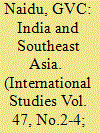

|
|
|
|
|
| Publication |
2010.
|
| Summary/Abstract |
Southeast Asia has always occupied a unique place in India's external relations since ancient times but colonialism, followed by the Cold War, severely hampered these links. These could only be revived in the early 1990s, driven by economic and political exigencies, through what is called the 'Look East' policy. It has since gathered enormous momentum and evolved into a comprehensive approach encompassing economic, political and strategic facets. Despite being a relatively minor player economically, India's importance in the emerging regional order is becoming vital. Its engagement of East Asia cannot be construed as the loss of Southeast Asia. The region will continue to remain India's major focus because of its geostrategic significance and the instrumental value of the Association of Southeast Asian Nations (ASEAN).
|
|
|
|
|
|
|
|
|
|
|
|
|
|
|
|
| 10 |
ID:
113262
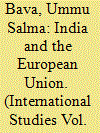

|
|
|
|
|
| Publication |
2010.
|
| Summary/Abstract |
Relations between India and the European Union (EU) have evolved over a long period. Beginning in the early 1960s, with diplomatic relations being established between India and the European Economic Community (EEC), it has expanded and subsequently been transformed because both India and the EU (since 1992) have assumed a growing significance in post-Cold War international politics. However, this partnership has not been able to achieve its potential partly because of the low political visibility of the EU and strong bilateral relations between India and major European powers. The India-EU relationship in the context of the strategic partnership launched in 2004 has witnessed a dramatic expansion of engagement from the economic to the political and security realms, although the strategic partnership does not mean absence of differences and difficulties. There is, however, a perception that India's closeness to the US has impacted the development of partnerships with both the EU and major individual countries.
|
|
|
|
|
|
|
|
|
|
|
|
|
|
|
|
| 11 |
ID:
113261
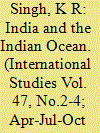

|
|
|
|
|
| Publication |
2010.
|
| Summary/Abstract |
India has not had a policy specific to the Indian Ocean beyond the knee-jerk and ad hoc responses to the changing regional and global environment. The Indian Navy, however, played a significant part in formulating the maritime perspective vis-à-vis the Indian Ocean and in dovetailing it with the country's larger foreign policy objectives in the region. Owing to ill-advised responses to interventions from both within and outside the region, India faced near isolation in the Indian Ocean region during the second half of the Cold War era. India's sensitivity to new opportunities and concerns about emerging threats to the stability of the region have brought about a change in India's relationships after the end of the Cold War. At present, India's policy seems to be motivated by priorities such as energy security, war on terror and maritime security. As a major regional power and enjoying greater credibility than during the Cold War era, India should act as a facilitator to build structures of maritime cooperation in the Indian Ocean region that can help integrate the littoral states and thus pave the way for a firmer foundation for a future peace zone in the Indian Ocean.
|
|
|
|
|
|
|
|
|
|
|
|
|
|
|
|
| 12 |
ID:
113257
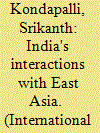

|
|
|
|
|
| Publication |
2010.
|
| Summary/Abstract |
India's relations with countries of East Asia reveal its growing profile in the region in economic, technological, diplomatic, political and military spheres. India's Look East policy, initiated in 1992, is bearing fruit now, as seen in the region becoming the largest trading partner of India, enhanced bilateral and multilateral diplomatic interactions, and long-term commitments in the security (maritime, cyber and space) fields. No doubt, relations between India and East Asia are acquiring depth as reflected in the broad-based interactions at the bilateral and multilateral levels as well as in trade, investments and people-to-people contacts in recent years. While Japan and both Koreas pose no major hurdle to India's foreign policy goal of garnering support for its basic cause of territorial integrity and sovereignty, the equation with China presents a very complicated picture. The apparent lack of insistence on the reciprocity principle by India in its dealings with China reflects the growing asymmetries in power between the two. As a result, India has been trying to enhance its defence cooperation with South Korea and Japan.
|
|
|
|
|
|
|
|
|
|
|
|
|
|
|
|
| 13 |
ID:
113247
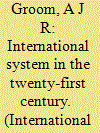

|
|
|
|
|
| Publication |
2010.
|
| Summary/Abstract |
A speculative analysis of disturbing trends evident now, which will require attention from decision-makers in twenty-five years time, identifies a number of problems with structural implications. Assets for broaching these problems are analyzed leading to an assessment of the requirements for global leadership. A comparison between the situation in 2010 and 2035 demonstrates the necessity for and likelihood of change. Options range from global suicide to a consortium of rising and declining great powers. The outcome will need to reflect forces rising bottom-up in global society. Examples of the strengths and weaknesses of India's contribution are given.
|
|
|
|
|
|
|
|
|
|
|
|
|
|
|
|
| 14 |
ID:
113263


|
|
|
|
|
| Publication |
2010.
|
| Summary/Abstract |
Latin America is finally on the radar of Indian foreign policy-makers after decades of peripheral engagement with the region. While the China factor may have prompted this rethinking, India has its own pragmatic reasons to cultivate the Latin American countries. The reasons for Latin America's new gaze falling on India are equally compelling-the end of the Cold War, the decline in US influence in the region and the spread and consolidation of democracy. The combination of new factors has allowed the region to search for partnerships far beyond the region, particularly Asia. If India provides attractive markets for resource rich Latin America, India is looking for new markets and investment destinations to meet the demands of its fast-growing economy. If India has to match China's presence in Latin America, it will need to address various impediments like high tariffs, prohibitive transportation costs and other trade barriers.
|
|
|
|
|
|
|
|
|
|
|
|
|
|
|
|
| 15 |
ID:
113248
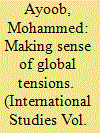

|
|
|
|
|
| Publication |
2010.
|
| Summary/Abstract |
The tension between the hegemonic and subaltern perspectives of international order can be summarized in the following fashion: While the former emphasizes order among states and justice within them, the latter stresses order within states and justice among them. This tension has manifested itself, although not always very neatly, in such diverse arenas of international politics as humanitarian intervention, nuclear proliferation and residual colonialism. While the tension between the dominant and subaltern views of world order is a global phenomenon, it finds manifestation in its most acute form in the broader Middle East, comprising West, Southwest and Central Asia. This is because issues such as Iran's nuclear aspirations, Israel's occupation of Palestine, and the rise of political Islam as the anti-hegemonic ideology par excellence highlight this tension most clearly.
|
|
|
|
|
|
|
|
|
|
|
|
|
|
|
|
| 16 |
ID:
113250


|
|
|
|
|
| Publication |
2010.
|
| Summary/Abstract |
The article maps and assesses Indian foreign economic policy (FEP). It opens with a critical discussion of different phases of Indian FEP in the period after Independence. It is seen that with the inauguration of neo-liberal reforms in 1991 Indian FEP moved away from the Nehruvian framework that had as its goal an independent and self-reliant path of development. India is today lending uncritical support to a liberal international economic order in the belief that it will help sustain high growth rates. While this move enhances opportunities for India through greater integration with the global economy, it has also meant a loss of critical policy space with an adverse impact on the ability of the state to pursue the goal of 'development as freedom'. This conclusion is sustained through a preliminary assessment of the record of Indian FEP in select areas, viz., financial, trade, investment and energy policies. In the circumstances it is regrettable that in the wake of the global economic crisis India made no attempt to articulate an alternative vision of the international economic order. It instead accepted to be co-opted by the developed world in exchange for membership in G-20 and other limited concessions that have been used to legitimize an unjust international economic system. The article concludes with a few recommendations that can be accommodated within the framework of India's current FEP. These can yet enhance the possibility of realizing the vision of justice embodied in the Constitution of India.
|
|
|
|
|
|
|
|
|
|
|
|
|
|
|
|
| 17 |
ID:
113259
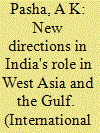

|
|
|
|
|
| Publication |
2010.
|
| Summary/Abstract |
Friendly and beneficial relations with the countries of West Asia, and the Gulf region in particular, have remained a key component of India's foreign policy on account of geopolitical, economic and strategic interests. The reasons for significance of this region for India now go beyond the assured supplies of energy resources. While non-alignment as a bonding has declined in bilateral relations with countries like Egypt after the end of the Cold War, the opportunities for trade and investments have gained salience in India's relations with the Gulf Cooperation Council (GCC) countries. The political uncertainty over the representative character of regimes in many countries of the region, the political fallout of the United States' policies and interests in respect of Iraq, Iran and the Palestine issue, along with India's new priorities in the form of stronger linkages with both the US and Israel could impinge on India's role in the region. It is in India's economic and strategic interest to maintain a positive relationship with all the West Asian countries by avoiding any undue influence from the US or Israel. It is also incumbent on India to stand by the people's voice for the introduction of genuine democratic political systems in these countries.
|
|
|
|
|
|
|
|
|
|
|
|
|
|
|
|
| 18 |
ID:
113251
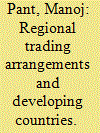

|
|
|
|
|
| Publication |
2010.
|
| Summary/Abstract |
One of the remarkable features of international trade has been the explosion of regional trading arrangements (RTAs) especially after 1990. In particular, developing countries have been in the forefront in contracting RTAs, especially among themselves. The period after 1995 is also characterized by the growth of trade among developing countries while their trade with developed countries has been on the decline. It seems that the latter phenomenon is driven by RTAs. India too has been very active in recent years in contracting RTAs. This article argues that the causality seems to be from trade to RTAs rather than the other way round. It is seen that conventional gains from RTAs via tariff reduction do not show up in empirical work. RTAs thus do not lead to increased trade among countries and are, in fact, a de facto rationalization of growing trade relations between countries. It is argued further that the growth in RTAs is explained more by developments in international politics and the emergence of a multi-polar world rather than by the conventional calculus of economic theory.
|
|
|
|
|
|
|
|
|
|
|
|
|
|
|
|
| 19 |
ID:
113265
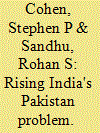

|
|
|
|
|
| Publication |
2010.
|
| Summary/Abstract |
This article identifies the persistent India-Pakistan rivalry as a paired minority conflict and argues that, as the predominant actor, India needs to shed its historical complexes and engage Pakistan proactively. By transcending its traditional reluctance, fears and prejudices, India must demonstrate that it can make use of its recently established economic and socio-political clout to be a dominant force in the region. A review of different scenarios for the future of Pakistan and possible Indian responses to another terrorist attack on Mumbai indicates that India's best option would be to evolve a multilevel and long-term 'carrot and stick' strategy towards its neighbour. Beyond ineffectual Track II dialogues, an excessive focus on Kashmir and myopic decisions determined by domestic contingencies, India needs to build the necessary trust and solve its Pakistan problem by focusing on deeper economic interdependence and sustained civil society contacts, and revive its nuclear disarmament plans.
|
|
|
|
|
|
|
|
|
|
|
|
|
|
|
|
|
|
|
|
|